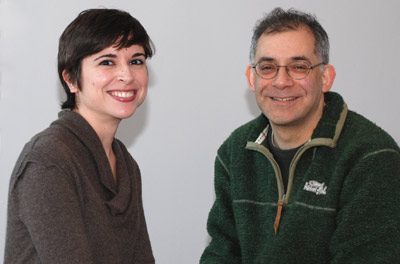The incredible journey
Mon, 30 Jan 2012 16:01:00 GMT
University’s new professor plays a key role in uncovering the story of how humans migrated from their African homeland to the rest of the globe – via Arabia

Professor Martin Richards and researcher Dr Maria Pala
HUMANS originated in Africa. But what route did they take as they began to disperse around the world 60,000 years ago? A new professor at the University of Huddersfield has played a key role in finding the answer to one of the most fundamental questions in the history of mankind.
DNA analysis now points strongly to the fact that modern humans settled in Arabia on their way from the Horn of Africa to the rest of the world. The latest issue of the prestigious American Journal of Human Genetics describes the research project that led to this conclusion.
One of its lead authors is Martin Richards, who has now become Professor of Archaeogenetics at the University of Huddersfield, where he is joined by his team of specialists.
Professor Richards, who moves to Huddersfield from the University of Leeds, is a pioneer in the field – one of just two professors of archaeogenetics in the world. He uses DNA evidence to study human origins, comparing data from modern samples across the world and occasionally to that which can be obtained from ancient sources such as skeletal remains and fossilised teeth. It leads to a vivid picture of the migration patterns of humankind and the origins of civilisation.
The research which led to the latest findings was carried out with major international partners, and explored the unanswered question of humankind’s movement from its African homeland by analysing three of the earliest non-African maternal lineages. Researchers compared complete mitochondrial DNA genomes – which trace the female line of descent – from Arabia and the Near East with a database of hundreds more samples from Europe.
Evidence was found for an ancient ancestry within Arabia. Professor Richards concludes: “Our latest results suggest that Arabia was indeed the first staging-post in the spread of modern humans around the world.”
Professor Richards began his academic career with degrees in genetics at the universities of Sheffield and Manchester. Then he decided on a new direction. “After doing my PhD I was interested in doing something that had more of a humanities base to it and archaeogenetics is obviously very much connected with human history,”
Professor Richards spent ten years as a researcher at Oxford University before first coming to the University of Huddersfield for a lecturing post in 2000. He then moved to Leeds, where he was awarded his professorship, before returning to Huddersfield, where he is currently equipping archaeogenetics research facilities. He is joined by his colleagues Dr Maria Pala, Dr Paul Brotherton and Dr Martin Carr.
One laboratory is being set up for the main molecular biology work and a separate lab built for the analysis of ancient DNA. There must be no risk of the evidence being cross-contaminated. “It’s like forensics but even more so. It has to be in another building, segregated from the rest of the work we do here,” said Professor Richards.
Postgraduates will be recruited to study archaeogenetics at Huddersfield – to join an expanding field of research that aims to establish the history of the dispersal of human populations around the world.







